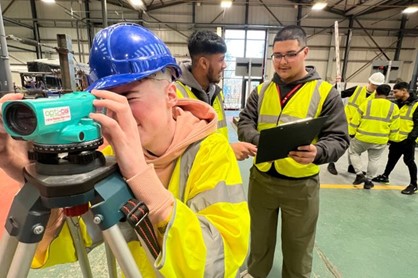
Civil Engineering (Design, Surveying, Planning for Construction) - T-Level
Start Date: 1st September 2026

- Length 2 years
- Study Full-Time
- Location Rye Hill Campus
Qualification Gained
Pearson Level 3 T Level in Design, Surveying and Planning for Construction – Civil Engineering
Levels ExplainedMore about the course
Are you passionate about building a better future? Civil engineering plays a vital role in society, and this T-Level in Civil Engineering will equip you with the knowledge and skills needed to excel in the design, surveying and planning aspects of construction.
Core modules such as health and safety, measurement, building technology, digital technology and construction mathematical techniques will provide you with a solid foundation in the fundamentals of civil engineering; whilst topics such as design, sustainability, relationship management, commercial business, project management and law will give you a broader understanding of the industry.
You will be taught by industry-experienced tutors in our specialist Rail and Civil Engineering Academy. You will also undertake a work placement with an employer for a minimum of 45 days, giving you the chance to put your new skills into practice in real-world scenarios.
You will complete this course with the ability to analyse civil engineering solutions, design civil engineering solutions and verify the delivery of civil engineering solutions.
Get in touch
Meet our staff and students

Dan Hegarty
Curriculum Lead - Rail and Civil"The courses have been written with the needs and wants of industry in mind. Our Rail and Civil degrees have been informed by industry leaders, ensuring our students are studying the most up-to-date and relevant modules. Furthermore, the support students receive both academically and personally is outstanding."
What can I do with a qualification in Rail and Civil Engineering?
Daily tasks:
- Organises and establishes control systems to monitor operational efficiency and performance of materials and systems.
- Ensures that equipment, operation and maintenance comply with design specifications and safety standards.
- Designs mechanical equipment, such as steam, internal combustion and other non-electrical motors for railway locomotives, road vehicles, aeroplanes and other machinery.
- Determines materials, equipment, piping, capacities, layout of plant or system and specification for manufacture.
- Undertakes research and advises on energy use, materials handling, thermodynamic processes, fluid mechanics, vehicles and environmental controls.
Powered by EMSI
Daily tasks:
- Organises and establishes control systems to monitor the performance and safety of electrical assemblies and systems.
- Ensures that manufacture, operation and maintenance comply with design specifications and contractual arrangements.
- Determines and specifies manufacturing methods of electrical systems.
- Supervises, controls and monitors the operation of electrical generation, transmission and distribution systems.
Powered by EMSI
Daily tasks:
- Prepares specifications for materials and other components.
- Produces final design information for use in preparation of layouts, parts lists, etc..
- Arranges construction and testing of model or prototype and modifies design if necessary.
- Prepares working designs for steam, aero, turbine, marine and electrical engines, mechanical instruments, aircraft and missile structures, vehicle and ship structures, plant and machinery equipment, domestic electrical appliances, building systems and services, and electronic computing and telecommunications equipment.
- Assesses product requirements, including costs, manufacturing feasibility and market requirements.
Powered by EMSI
Daily tasks:
- Provides technical consultancy services.
- Examines and advises on patent applications.
- Prepare sketches, drawings and specifications showing materials to be used, construction and finishing methods and other details.
- Devises and implements control systems to monitor operational efficiency and performance of system and materials.
- Designs new systems and equipment with regard to cost, market requirements and feasibility of manufacture.
- Establishes principles and techniques to improve the quality, durability and performance of materials such as textiles, glass, rubber, plastics, ceramics, metals and alloys.
- Researches into problem areas to advance basic knowledge, evaluate new theories and techniques and to solve specific problems.
Powered by EMSI
Daily tasks:
- Inspects and issues tickets on trains, deals with passenger enquiries, and takes charge of goods being transported on train.
- Checks control panel operation before start of journey, operates train door controls and signals to driver to start or stop train.
- Attends to the safety, welfare and comfort of passengers on trains and manages train crew.
- Assists passengers with special needs to board and leave trains.
- Loads and unloads mail, goods and luggage, operates lifts and hoists and drives small trucks.
- Helps with passenger enquiries and makes announcements over a public address system at stations.
- Examines and collects tickets at the ticket barrier of a railway station.
Powered by EMSI
Daily tasks:
- Monitors the standards of scientific and technical research undertaken by the research team.
- Plans work schedules, assigns tasks and delegates responsibilities to the research and development team.
- Develops research methodology, implements and reports upon research investigations undertaken.
- Liaises with production departments to investigate and resolve manufacturing problems.
- Establishes product design and performance objectives in consultation with other business functions.
Powered by EMSI
Daily tasks:
- Fastens together sections of rail by bolting fishplates to rails.
- Positions lengths of rail, sets of points and crossovers and secures rail with bolts, wooden wedges or clips.
- Spreads ballast and lays sleepers or metal plates at specified intervals.
- Lubricates points, examines fences, drains, culverts and embankments and carries out any necessary maintenance.
- Checks tightness of bolts and wedges, replaces damaged rail chairs and repacks ballast under sleepers if necessary.
- Patrols length of track and visually inspects rails, bolts, fishplates and chairs for distortion or fracture.
Powered by EMSI
Daily tasks:
- Checks loading of tubs and carriages, and informs driver of load distribution and any special features of route.
- Assists drivers in the operation of diesel, diesel-electric, electric and steam locomotives.
- Examines shunting instructions, uncouples wagons and coaches, guides movement of carriages using manual points and wagon breaks, links-up carriages, ensures security of couplings and reconnects brake and heating systems.
- Operates signals and opens and closes barriers at level crossings as required.
- Examines schedules and decides priority of movement of trains, monitors movement of trains and issues instructions to drivers, signal operatives and level crossing keepers.
- Provides crews for breakdown trains, allocates relief and replacement crews as necessary, keeps crews informed of any line repairs or restrictions, and checks train running times for punctuality.
Powered by EMSI
What can I do with a qualification in Rail and Civil Engineering?
Mechanical engineers
Daily tasks:
- Organises and establishes control systems to monitor operational efficiency and performance of materials and systems.
- Ensures that equipment, operation and maintenance comply with design specifications and safety standards.
- Designs mechanical equipment, such as steam, internal combustion and other non-electrical motors for railway locomotives, road vehicles, aeroplanes and other machinery.
- Determines materials, equipment, piping, capacities, layout of plant or system and specification for manufacture.
- Undertakes research and advises on energy use, materials handling, thermodynamic processes, fluid mechanics, vehicles and environmental controls.
Powered by EMSI
Electrical engineers
Daily tasks:
- Organises and establishes control systems to monitor the performance and safety of electrical assemblies and systems.
- Ensures that manufacture, operation and maintenance comply with design specifications and contractual arrangements.
- Determines and specifies manufacturing methods of electrical systems.
- Supervises, controls and monitors the operation of electrical generation, transmission and distribution systems.
Powered by EMSI
Design and development engineers
Daily tasks:
- Prepares specifications for materials and other components.
- Produces final design information for use in preparation of layouts, parts lists, etc..
- Arranges construction and testing of model or prototype and modifies design if necessary.
- Prepares working designs for steam, aero, turbine, marine and electrical engines, mechanical instruments, aircraft and missile structures, vehicle and ship structures, plant and machinery equipment, domestic electrical appliances, building systems and services, and electronic computing and telecommunications equipment.
- Assesses product requirements, including costs, manufacturing feasibility and market requirements.
Powered by EMSI
Engineering professionals n.e.c.
Daily tasks:
- Provides technical consultancy services.
- Examines and advises on patent applications.
- Prepare sketches, drawings and specifications showing materials to be used, construction and finishing methods and other details.
- Devises and implements control systems to monitor operational efficiency and performance of system and materials.
- Designs new systems and equipment with regard to cost, market requirements and feasibility of manufacture.
- Establishes principles and techniques to improve the quality, durability and performance of materials such as textiles, glass, rubber, plastics, ceramics, metals and alloys.
- Researches into problem areas to advance basic knowledge, evaluate new theories and techniques and to solve specific problems.
Powered by EMSI
Rail travel assistants
Daily tasks:
- Inspects and issues tickets on trains, deals with passenger enquiries, and takes charge of goods being transported on train.
- Checks control panel operation before start of journey, operates train door controls and signals to driver to start or stop train.
- Attends to the safety, welfare and comfort of passengers on trains and manages train crew.
- Assists passengers with special needs to board and leave trains.
- Loads and unloads mail, goods and luggage, operates lifts and hoists and drives small trucks.
- Helps with passenger enquiries and makes announcements over a public address system at stations.
- Examines and collects tickets at the ticket barrier of a railway station.
Powered by EMSI
Research and Development Managers
Daily tasks:
- Monitors the standards of scientific and technical research undertaken by the research team.
- Plans work schedules, assigns tasks and delegates responsibilities to the research and development team.
- Develops research methodology, implements and reports upon research investigations undertaken.
- Liaises with production departments to investigate and resolve manufacturing problems.
- Establishes product design and performance objectives in consultation with other business functions.
Powered by EMSI
Rail Construction and Maintenance Operatives
Daily tasks:
- Fastens together sections of rail by bolting fishplates to rails.
- Positions lengths of rail, sets of points and crossovers and secures rail with bolts, wooden wedges or clips.
- Spreads ballast and lays sleepers or metal plates at specified intervals.
- Lubricates points, examines fences, drains, culverts and embankments and carries out any necessary maintenance.
- Checks tightness of bolts and wedges, replaces damaged rail chairs and repacks ballast under sleepers if necessary.
- Patrols length of track and visually inspects rails, bolts, fishplates and chairs for distortion or fracture.
Powered by EMSI
Rail Transport Operatives
Daily tasks:
- Checks loading of tubs and carriages, and informs driver of load distribution and any special features of route.
- Assists drivers in the operation of diesel, diesel-electric, electric and steam locomotives.
- Examines shunting instructions, uncouples wagons and coaches, guides movement of carriages using manual points and wagon breaks, links-up carriages, ensures security of couplings and reconnects brake and heating systems.
- Operates signals and opens and closes barriers at level crossings as required.
- Examines schedules and decides priority of movement of trains, monitors movement of trains and issues instructions to drivers, signal operatives and level crossing keepers.
- Provides crews for breakdown trains, allocates relief and replacement crews as necessary, keeps crews informed of any line repairs or restrictions, and checks train running times for punctuality.
Powered by EMSI
Good to know
What's happening?
Either
- The level required to start the course
- The level rewarded when completing the course
Not a Newcastle College student?
If you are not currently a Newcastle College student, apply here:
VISIT UCASNewcastle College students
If you are a current Newcastle College student, apply here:
CURRENT STUDENT APPLICATIONor Continue Browsing
Course Added
This course has now been added to your basket. Please click below to apply now or continue browsing.
Apply Now Levels Explained
Levels Explained
 Learning and Pastoral Support
Learning and Pastoral Support
 College or Sixth Form. What's the difference?
College or Sixth Form. What's the difference?
 How to Make an Application
How to Make an Application


